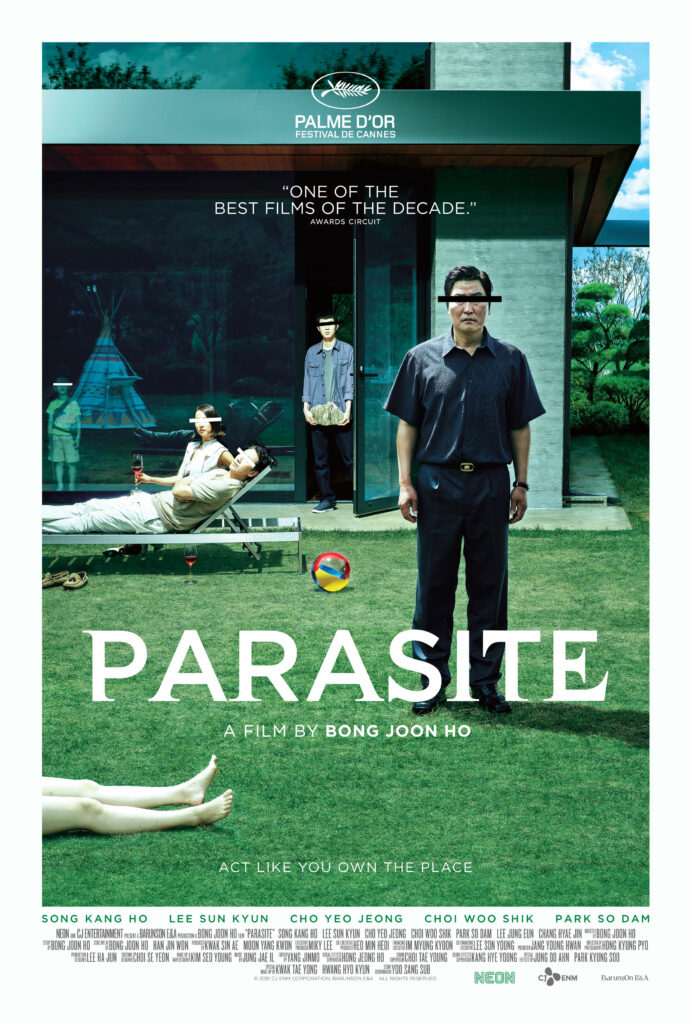For this week’s blog post, I’ll explore the film “Parasite” directed by Bong Joon-ho. “Parasite” is a cultural resource that presents a reimagined alternative to current social and economic conditions. The film offers a sharp critique of class disparity and social inequality, highlighting the vast divide between the wealthy and the poor. Through its narrative and visual storytelling, “Parasite” challenges the status quo and imagines a society where these economic disparities are questioned and examined more critically.

“Parasite” tells the story of the Kim family, who live in a semi-basement apartment and struggle to make ends meet. In contrast, the wealthy Park family lives in a spacious, modern home. The Kim family infiltrates the Park household by posing as highly qualified individuals, and as they become entangled in the lives of the Parks, the film exposes the hidden tensions and inequalities between the two families. This stark juxtaposition between the Kims and the Parks serves as a powerful commentary on the economic divide and the lengths to which people will go to survive and thrive within such a system.

The film reimagines the current social and economic conditions by proposing an alternative where the stark divide between the rich and the poor is brought to the forefront of public consciousness. In the world of “Parasite,” the idea of social mobility and meritocracy is questioned, and the film suggests that systemic change is necessary to address these deep-rooted inequalities. The imagined alternative presented by “Parasite” is not just a shift in individual attitudes but a call for a broader societal transformation that addresses the underlying structures of economic disparity.
For this imagined alternative to become a reality, significant technological and systemic changes would be required. Technologically, there would need to be more equitable access to resources such as education, healthcare, and employment opportunities. This could involve the development of new technologies that make these resources more accessible and affordable for everyone, regardless of their socio-economic status. Additionally, systemic changes would be necessary to address the root causes of economic inequality, such as implementing progressive tax policies, increasing the minimum wage, and providing social safety nets for those in need.
While “Parasite” presents a largely reimagined condition, there are elements of this alternative that are reflected in current conditions. For example, the film’s portrayal of the gig economy and precarious work resonates with many people’s experiences in today’s labor market. The Kims’ various schemes to make money and their struggles to secure stable employment reflect the challenges faced by many individuals in an increasingly unstable and competitive job market. “Bong’s command of the medium is thrilling. He likes to move the camera, sometimes just to nudge your attention from where you think it should be, but always in concert with his restlessly inventive staging.” Additionally, the film’s exploration of the impact of economic inequality on personal relationships and mental health is a poignant reminder of the real-life consequences of these disparities.

However, “Parasite” also envisions a more radical reimagining of societal norms and structures. The film’s shocking and tragic conclusion serves as a powerful critique of the existing social order and a call to action for audiences to reconsider the systems that perpetuate inequality. It challenges viewers to imagine a world where the economic divide is not only acknowledged but actively addressed through collective action and systemic reform.
In conclusion, “Parasite” is a cultural resource that offers a reimagined alternative to current social and economic conditions. By highlighting the stark divide between the rich and the poor and questioning the notion of meritocracy, the film calls for significant technological and systemic changes to address these inequalities. While some elements of this imagined alternative are reflected in current conditions, “Parasite” ultimately envisions a more radical transformation of society, urging viewers to reconsider the systems that perpetuate inequality and to imagine a more equitable future.
Leave a Reply